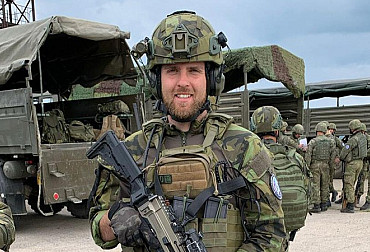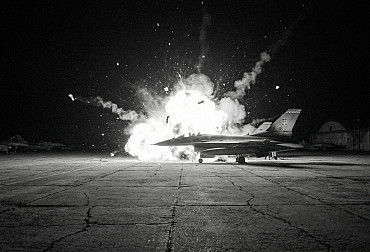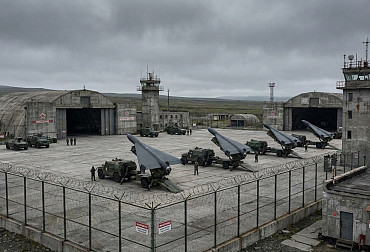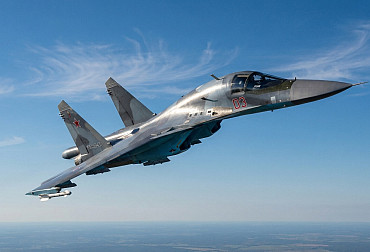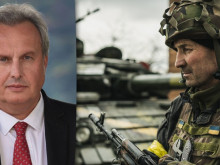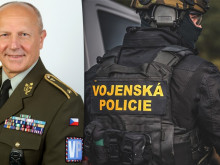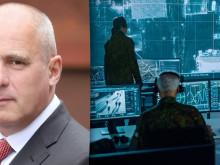Maj. Radek Pavlica: Trust and understanding are the foundation of open communication within the team
"The term officer is associated with dignity which comes from respect and a deeper understanding of the military environment, as well as the fact that good soldiers deserve good equipment," says Major Radek Pavlica, deputy commander of the 74th Mechanized Battalion in Bučovice, in an interview. The battalion, which is an integral part of the 7th Mechanized Brigade, will be the first to be re-equipped with new CV90 tracked infantry fighting vehicles. It will face the difficult task of integrating new technology and experienced soldiers into a perfectly functioning unit. In the interview, Major Pavlica not only looks back on his experiences to date, but also discusses the future that lies ahead for the Bučovice unit.

What inspired you to become a professional soldier?
To be honest, I had no idea that I could become a soldier, or that it was something you could study. In elementary school, I played hockey, didn't take any extra classes, practiced taekwondo martial arts, went swimming, and got pretty good grades. I had the option of going to a high school or a technical college, where I could continue playing hockey. However, neither option really appealed to me, so I looked for something I would enjoy, until my parents, more out of a dare, suggested I study at the military high school in Moravská Třebová. At that time, the admission process consisted of English, math, and physical tests (a one-kilometer run and pull-ups). Thanks to hockey and my academic results, which opened up the world of the military to me — a world I still enjoy today. After high school, I continued my studies at the University of Defense in Brno. When I joined the army, I was a kid from the housing estate, and it was the army environment that gave me order and discipline. I have been wearing a uniform since 2003, and I must say that for me, being a soldier has always been more than just a job or a paycheck. I still see it as a higher calling, a desire to protect our democratic values and, above all, freedom.
Looking back, how would you rate the level of teaching at the University of Defense in terms of expertise, and is there anything you would recommend including in the curriculum?
It is important to mention that the facilities and activities offered by the program develop students in all respects — but only if they are willing to engage. During my studies (2007 to 2012), I really missed having more practical experience with the military. The COMMANDOS group was an excellent substitute for this, but not everyone can join it, so this type of practical experience was selective. The group was based on voluntary participation, where, after passing a selection process that was not at all easy, tactics were practiced on weekends in training areas. Zdeněk Flasar had, and still has, a huge contribution to the functioning of the group. What we experienced as part of COMMANDOS shaped not only our personalities, but also our mutual relationships and bonds, which continue to this day. My former roommate from college and current advisor to the Minister of Defense, Petr Matouš, and I still remember some situations to this day.

But back to the question about recommendations for teaching at the University of Defense. I feel that, thanks to the proactive leadership of the Department of All-Arms Tactics, there is currently a lot of pressure on students to spend as much time as possible with units during their internships and soak up the reality of army life. Completing internships and courses is a very good step forward, which I would definitely maintain. This is then evident when new recruits arrive at the battalion. I am very pleased that we in Bučovice can also help with this practice-oriented initiative.
What I would change or introduce is a rotation cycle for instructors (with the rank of captain or major), whereby after a certain period of time, ideally four years, they would return to the troops. This cycle length corresponds to the length of the decisive period and is just long enough to ensure that there is still harmony between theory and how things actually work in the real environment of the units. What the instructors then pass on to the students corresponds to practice, and this is valuable information that future officers can work with. The clash with reality is then not so surprising.
How many of the instructors had professional experience gained in missions and at the command levels of the Czech Armed Forces?
During my studies, I had a very positive impression of Lieutenant Colonel Černý, who, I believe, held a position at the headquarters of the 7th Mechanized Brigade at the time. As part of our master's program, he shared his real-world experience with us — we found it fascinating and useful later on.
In general, however, I must say that at the time of my studies, the quality of instructors of military subjects was rather below average. But that is not the case today. Over the past thirteen years, the department has made significant progress. I feel that the quality of the teaching staff has improved significantly. There are many members with many years of experience in the military. Our battalion currently works very closely with the Department of All-Arms Tactics. This involves sharing ideas, student internships, sharing training facilities, and many other mutually beneficial advantages.
When you became a lieutenant and joined the unit, how big was the difference between the theory you had been taught and the reality of platoon-level practice?
It was quite a reality check. At school, we learned a lot of theoretical things that could only be applied in higher positions. As students, we had a huge theoretical foundation, but honestly, we didn't know how to put that knowledge into practice. I was lucky to have excellent people in my platoon; the whole company felt like one family. I was also lucky to have an excellent battalion commander, the current General Petr Svoboda, who gave me the basics that I still follow today. Some key lessons I still remember include: "the team is always more than the individual," "never punish mistakes made on initiative, but punish mistakes made out of laziness," and, above all, the motto of the 74th Mechanized Battalion: "Prove your love for your country through action."
In practice, it also helped me greatly that after taking up my position, I attended a series of BMATT courses and successfully completed the KOMANDO course. The knowledge and skills I acquired benefited the entire unit.
Later, you became a company commander. What was the turnover of soldiers like, and to what extent does this affect the quality and level of training, not to mention combat readiness?
I became a company commander after gaining experience as a platoon commander, deputy company commander, and battalion combat training group chief. I did not actually perform the latter function. Right from the start, I was assigned as the chief of the 11th SR BAF Operational Group. Our 74th Mechanized Battalion was given this mission in 2018. It was commanded by the excellent officer Captain Miroslav Maixner, who is currently a lieutenant colonel and commander of the Bučovice Battalion.
I have to say a few words about my current commander — he truly deserves it. His personal approach, leadership, and experience have been a huge motivator and unifying factor for the unit. The saying that the army is like a second family is absolutely true. When my first wife Lenka died after giving birth in 2017, Mira helped me cope with this loss, both personally and professionally.
After my previous experiences from two deployments in Afghanistan and training in Lithuania, when I took up the position of company commander, I tried to create the most cohesive team possible within the unit, even under the demanding conditions of training. We spend more time at work and on exercises than at home with our families, so a functioning team was and is a high priority and also an asset for me.
When I joined, the unit was transitioning from a light motorized to a mechanized battalion. Shortly thereafter, the COVID pandemic hit. So, in terms of training and gaining experience with the newly introduced BVP-2 vehicles, the conditions were not entirely ideal. That made me appreciate even more that we could share our experience within the 7th Mechanized Brigade and didn’t have to start entirely from scratch.
Another challenge was staff turnover, which basically continues in the Armed Forces to this day. A significant proportion of graduates of basic military training left the Czech Armed Forces within two years, and continue to do so. This makes it difficult to maintain a certain level of training. For this reason, we have focused more on the preparation and education of the command corps. Currently, our battalion places enormous emphasis on PVPŠ (a Czech abbreviation for commander and staff training), because no one can ever take away your knowledge and experience. And we do everything we can to ensure that this type of education is diverse, practical, and has an impact not only professionally but also personally.
You have participated in several missions, including combat missions. In your opinion, what has the Czech Army gained from its deployment abroad, especially in terms of the level of experience gained?
I see a huge benefit mainly in the functioning of the unit under allied command in an international environment. Another invaluable experience is that some of our deployed soldiers who actively fought the enemy now hold senior positions in both the warrant officer and officer corps.
The missions in Afghanistan showed how valuable our soldiers are and that investing in people is the key to success. It is true that at that time we operated primarily under coalition logistical support, but the skill and knowledge of our people proved that we have every reason to be proud. On the contrary, we have every right to be proud.

The downside of these foreign operations was that we went through what is known as Afghanization (i.e., focusing solely on the success of foreign operations), where we focused all our efforts solely on being successful in foreign operations. At that time, we somewhat forgot what it was like to be logistically self-sufficient. And above all, what it was like to train new soldiers who came after recruitment at a time when the missions in Afghanistan had ended and we had to start training "green and black" tactics again. That said, nothing and no one adapts better than a Czech soldier. Currently, these phenomena are no longer so visible, and units are focusing their training on being effective on the modern battlefield.
Not only foreign missions, but also other tasks entrusted to us have borne fruit. I would mention, for example, our experience in training Ukrainian soldiers on our territory. As battalions, we coordinated and worked together on the concept of a mobile command post, which is essentially based on two Tatra trucks, replacing the original concept of a "tent city." We are also using drones more and more. We are building trench systems for training units and expanding our battalion training facilities, mainly thanks to cooperation agreements with civilian entities. We then share these innovations within the brigade and between individual battalions.

You were Chief of Staff during the 3rd ACR Slovakia mission. To what extent did the experience you gained during your military service suffice for this position, and what new experiences and insights did you gain from this mission?
I was assigned to the 3rd ACR relatively soon after arriving at the operations department of the 7th Mechanized Brigade. I benefited greatly from my experience in foreign operations and the perspective I gained from my position as commander of a mechanized company. Colonel Miroslav Vybíhal, who was the commander of the entire contingent, was a great role model. As part of our preparations, we wanted to assist as much as possible in preparing the 74th Mechanized Battalion, which formed the core of this group, as part of the MNCE (Multinational Coordination Element). Since I grew up in this battalion, it is closest to my heart. After my experience at higher headquarters, where I had the opportunity to compare, I saw and knew that the Bučovice battalion had a lot of high-quality personnel and a desire to improve the system.
Under Colonel Vybíhal’s command, we managed to unite the entire international group and create an effective working environment. This allowed us to facilitate all processes for the battalion, which performed excellently in Slovakia and could fully focus on training. I know that peacekeeping missions in support of NATO's eastern flank are not as promising as the missions in Afghanistan and Africa used to be, but on the other hand, these training missions gave us, as an army, the opportunity to train in an international environment. And let's be honest, what other battalion would be able to conduct three battalion training exercises in six months?

From my foreign deployment in Slovakia, I gained a broader perspective, an understanding of international relations, and, although it may sound like a cliché, a complete inner harmony with the motto "We are stronger together."
You are currently the deputy commander of the 74th Mechanized Brigade. You had to work your way up from the bottom and gain valuable experience to reach your position and rank. With that in mind, how do you feel about the fact that in the Czech Armed Forces, it is possible to obtain the rank of captain or major after completing basic training without any experience?
That's a very interesting question. Personally, the term officer is associated with dignity which comes from respect and a deeper knowledge of the military environment, as well as the fact that good soldiers deserve good equipment. These two aspects develop naturally as one progresses through positions. If we recruit a civilian and want or need to make them an officer, I believe they should start at the rank of lieutenant. If it makes sense, we can pay them in a way other than the standard service tariff, for example with a higher stabilization allowance. In specialist positions recruited from civilian life, we do not need soldiers with the ranks of captain, major, or lieutenant colonel. Ranks are not just about the level of education achieved or the length of practical experience, they are also about the scope of responsibilities, job content, and military knowledge acquired. And that should be taken into account.
The Czech Army suffers from a shortage of trained reserves. Would you be inclined to reinstate compulsory military service, perhaps following the example of Austria or Switzerland, where the results of replenishment would be seen within two years, or would you prefer to go down the route of active reserves, where personnel replenishment is not guaranteed?
At present, I would not be inclined towards compulsory military service. But I like the idea of our voluntary military training program (DVC), which operates on a voluntary basis and provides us with well-trained "foot soldiers" who we assign to our reserves. The training system has proven to be very effective in practice. I am all the more pleased that there is so much interest in it. I think it would be very beneficial if, in the future, DVC could be expanded for successful graduates to include courses such as air defense operators, radar operators, combat vehicle gunners, and the like. We need to speed up the training process on sophisticated weapon systems and at the same time introduce new ones, such as drone operators and cyber specialists.
We should be aware that the homeland and freedom we enjoy cannot be taken for granted. We must all contribute to it. Therefore, any activity related to knowledge and the development of skills leading to the defense of the state will help us protect our fundamental freedoms in the future.
Every armed conflict accelerates the development of weapon systems at all levels, as exemplified by the conflict between Ukraine and the Russian Federation. To what extent should a mechanized battalion prepare for the role of drones, both in defense and in offensive operations?
It should definitely prepare to such an extent that drones become an integral part of mechanized units. It is a well-known fact that the battlefield is currently overwhelmed with drones. We hear about drone attacks in the ongoing war in Ukraine almost every day in the media. The army must be able to engage the enemy with its own drones and eliminate enemy drones. We need to be able to detect and then destroy them.
The key to success is simply that each mechanized squad will have a drone for reconnaissance and a drone for carrying out attacks. Part of battalion training is therefore cooperation with members of the unmanned aerial vehicle battalion, which is a new and definitely necessary trend that the army is now pursuing. However, we must not rest on our laurels; it is necessary to gradually develop work with drones at the platoon and company level, with the entire picture of the battlefield then being completed by the data and reconnaissance output provided by battalion-level drones..
What do you think is essential for every army – high-quality, well-trained personnel or high-quality equipment?
This question should be phrased a little differently: Do our high-quality personnel deserve high-quality, appropriate equipment? In my opinion, the answer is definitely yes. One cannot function effectively on the battlefield or in any other operation without the other.
What is essential for the sustainability of people in the army?
In our battalion, we apply the principles of "mission command." This type of command leads to an improvement in the culture of the organization, which is key today to attracting and retaining the younger generation and, last but not least, retaining experienced personnel. The principles applied by mission command are: competence, mutual trust, shared understanding, commander's intent, disciplined initiative, and risk acceptance. We apply all these principles in practice at the 74th Mechanized Battalion — and the results speak for themselves. When assigning a task, purpose (explanation of why I am to perform a given task), and limitations, commanders at various levels themselves seek ways to complete the task in the best and most effective way possible. This increases not only the quality of the output, but also the motivation and responsibility of individuals.

Trust and shared understanding within the team create space for open communication. Everyone is encouraged to share their suggestions, whether they concern improvements to work and recreation areas, training facilities, or the processes themselves. I believe that every idea deserves attention. Even small suggestions that seem insignificant at first can ultimately have a big impact on the quality of the environment in which we serve. I often tell my colleagues not to be afraid to come up with suggestions. Even if they seem small or do not have a direct impact on the mechanized battalion's activities on the battlefield, they can still make a significant contribution to improving our organizational culture and effectiveness as a team.











